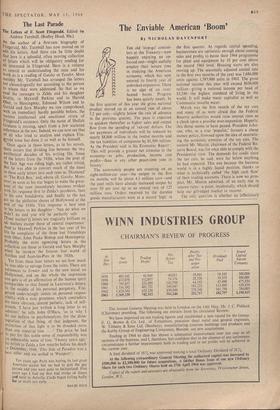The Last Parade
The Letters of F. Scott FitZgerald. Edited by As the author of a first-rate biography of Fitzgerald, Mr. Turnbull has now moved on to edit his letters. And there can be little doubt that here is a splendid, often moving collection of letters which will be obligatory reading for ail interested in Fitzgerald. Here is a volume as central to understanding the man and his Work as is a reading of Gatsby or Tender. Most sensibly Mr. Turnbull has arranged the letters not chronologically but according to the person to whom they were addressed. So that as we read the messages to Zelda and his daughter Scottie, to Maxwell Perkins and to Harold Ober, to Hemingway, Edmund Wilson and to Gerald and Sara Murphy we can comprehend, With an immediacy hardly possible before, the various intellectual and emotional strata of D'azgerald's existence. Only the name of Sheilah Graham is missing, apart from a few scattered references in the text. Indeed, we can now see that of all who tried to analyse and explain Fitz-
Serald has done it so well as he himself.
Once again in tnose letters, as in his novels, there occurs that dividing line between the two antithetical decades of his writing life. Some of the letters from the 1920s, when the poet of the Jazz Age was riding high, are rather trivial. 13, lit he was able to convert much of the tinsel In these early letters into such tales as `Diamond' or The Rich Boy,' and, above all, Gatsby. More- Over, as soon as his star began to wane the great- ness of the man immediately becomes evident , with his response first to Zelda's psychosis, then to his own breakdown, and finally to the last act on the philistine shores of Hollywood at the end of the 1930s. This response is best seen In his letters to his daughter.: .`Just do what we didn't do and you will be perfectly safe . . W.our mother's] letters are tragically brilliant on all matters except those of central importance.' And to Maxwell Perkins in the last year of his Ilf.e he complains of the three lost friendships With Ober, John Peake Bishop and Hemingway. Probably the most agonising letters in the collection are those to Gerald and Sara Murphy When he invokes the forever lost world of Antibes and Juan-les-Pins in the 1920s.
Yet from these later letters we see how much he was able to salvage from the ruins. There are references to Tender and to the new novel on Hollywood, and on the whole the impression one gets is of an affirmation of the human spirit comparable to that found in Lawrence's letters. In the middle of his personal purgatory. Fitz- gerald undeviatingly insists on personal respon- sibility with a stoic greatness, which contradicts his more obvious, almost pathetic, lack of self- esteem. 'I have just written a long letter to an admirer,' he tells John O'Hara, 'as to why I i not believe in psychoanalysis, for the disin- Itegration of that thing, of that judgment, the extinction of that light is to be dreaded more , than any material loss. . . .' The price he had to Pay for this noble sense of responsibility was 4n unbearable sense of loss. 'Twenty years ago.' lie writes to Zelda a few months before his death in December, 1940, 'This Side of Paradise was a est seller and we settled in Westport': Ten years ago Paris was having its last great American season but we had to quit the gay parade and you were gone to Switzerland. Five years ago I had my first bad stroke of illness and went to Ashville. Cards began falling badly for us much too early. . . .
DAVID REES






























 Previous page
Previous page